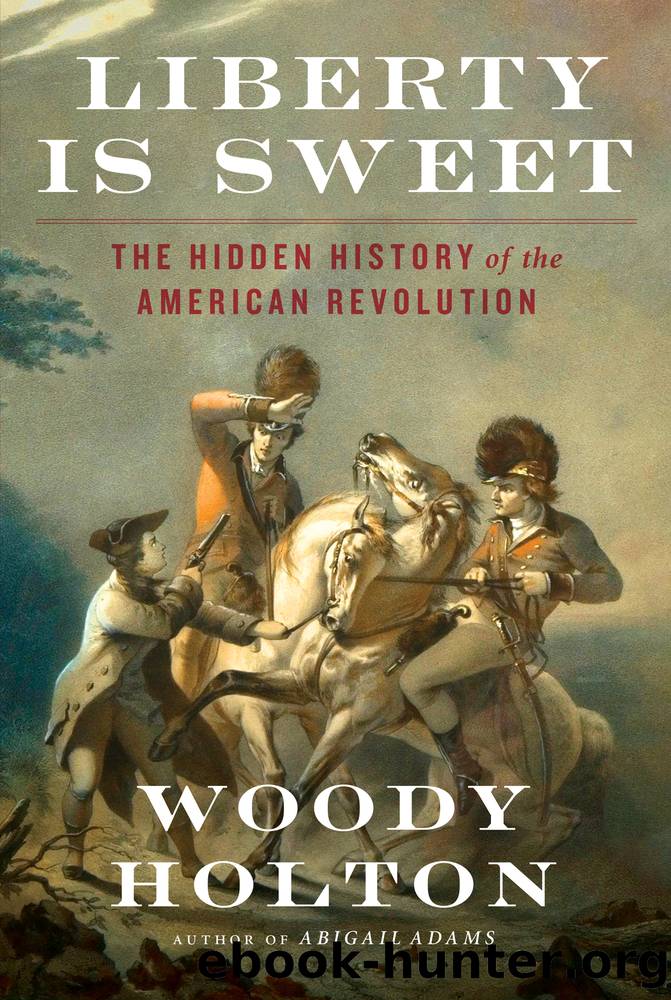Liberty Is Sweet by Woody Holton

Author:Woody Holton
Language: eng
Format: epub
Publisher: Simon & Schuster
Published: 2021-10-19T00:00:00+00:00
Even before driving Greene off, Rawdon had received instructions to leave Camden and march his army east to Monckâs Corner, just thirty miles north of Charles Town. During the battle, Greene captured several men who had fought on the American side and then deserted to the British. He hanged five of them, and when news of the executions reached the American deserters still with Rawdon, they refused to go out on patrols. The mutinous spirit spread through the Camden garrison, sealing Rawdonâs decision to evacuate. Heading east on May 10, the troops were accompanied by numerous Loyalists and as many as five hundred African Americans. Some had escaped from Whigs, while others remained the property of Loyalistsâliving reminders that Britainâs enlistment of rebelsâ slaves was an alliance of convenience.57
The day after Rawdon abandoned Camden, Thomas Sumter captured the eighty-man British garrison at Orangeburg, whereupon other nearby posts âfell in quick succession.â Months earlier, British soldiers had driven Rebecca Brewton Motte from her mansion near the confluence of the Congaree and Wateree Rivers, turning it into âthe principal depot of the convoys from Charleston to Cambden.â Lee and Marion laid siege to âfort Motteâ on May 8 and set slaves to work digging approach trenches. On the fourth day of the siege, Motte âpresented the besiegers with a quiver of African arrowsâ that they set ablaze and shot onto her roof, igniting it and forcing the nearly two hundred Loyalists inside to capitulate. (More than two hundred years later, a University of South Carolina archaeologist would dig up one of those arrows.)58
By the end of May 1781, the British had lost or left all of their posts in the Carolina backcountry except Ninety Six. London slave trader Richard Oswald was not surprised. When his friend and longtime trading partner Henry Laurens was captured at sea and imprisoned in the Tower of London, Oswald paid him a visit, and the two agreed that âthese remote Inland Situations,â far beyond the reach of supply ships, placed British regulars and American militia on an âunequal footing.â As Laurens explained to Oswald, the militiamen could travel light by subsisting on parched corn boiled into âa Sort of Saloop or Jelly.â In other words, an essential ingredient in the Whig victory was that classic First Nations contribution to southern cuisine, grits.59
Download
This site does not store any files on its server. We only index and link to content provided by other sites. Please contact the content providers to delete copyright contents if any and email us, we'll remove relevant links or contents immediately.
| Africa | Americas |
| Arctic & Antarctica | Asia |
| Australia & Oceania | Europe |
| Middle East | Russia |
| United States | World |
| Ancient Civilizations | Military |
| Historical Study & Educational Resources |
The Dawn of Everything by David Graeber & David Wengrow(1690)
The Bomber Mafia by Malcolm Gladwell(1618)
Facing the Mountain by Daniel James Brown(1542)
Submerged Prehistory by Benjamin Jonathan; & Clive Bonsall & Catriona Pickard & Anders Fischer(1444)
Wandering in Strange Lands by Morgan Jerkins(1415)
Tip Top by Bill James(1405)
Driving While Brown: Sheriff Joe Arpaio Versus the Latino Resistance by Terry Greene Sterling & Jude Joffe-Block(1361)
Red Roulette : An Insider's Story of Wealth, Power, Corruption, and Vengeance in Today's China (9781982156176) by Shum Desmond(1345)
Evil Geniuses: The Unmaking of America: A Recent History by Kurt Andersen(1339)
The Way of Fire and Ice: The Living Tradition of Norse Paganism by Ryan Smith(1322)
American Kompromat by Craig Unger(1306)
It Was All a Lie by Stuart Stevens;(1292)
F*cking History by The Captain(1289)
American Dreams by Unknown(1277)
Treasure Islands: Tax Havens and the Men who Stole the World by Nicholas Shaxson(1252)
Evil Geniuses by Kurt Andersen(1248)
White House Inc. by Dan Alexander(1205)
The First Conspiracy by Brad Meltzer & Josh Mensch(1166)
The Fifteen Biggest Lies about the Economy: And Everything Else the Right Doesn't Want You to Know about Taxes, Jobs, and Corporate America by Joshua Holland(1113)
